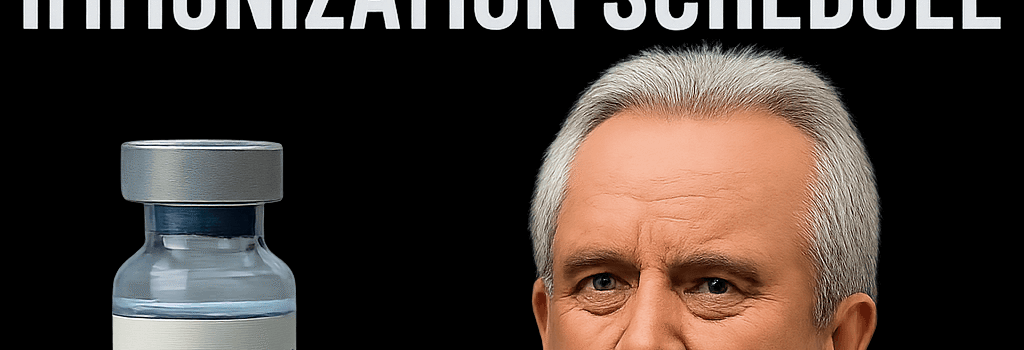RFK Jr. Vaccine Panel Reviews Childhood Immunization Schedule

Washington, D.C. – In a move that has alarmed public health experts, the newly reconstituted Advisory Committee on Immunization Practices (ACIP), appointed by Health Secretary Robert F. Kennedy Jr., convened for its inaugural meeting on June 25. The panel announced plans to reevaluate the entire childhood and adult vaccination schedules, injecting what many describe as anti-vaccine rhetoric into a body long respected for its rigorous, science-driven recommendations.
Background: ACIP’s Traditional Role
For over six decades, ACIP has served as the Centers for Disease Control and Prevention’s (CDC) principal scientific advisory committee on vaccines. Following Food and Drug Administration (FDA) licensure, ACIP conducts independent reviews of safety and efficacy data, then issues recommendations that all major insurers cover. This process integrates:
- Randomized controlled trial outcomes
- Post-marketing surveillance data from Vaccine Adverse Event Reporting System (VAERS) and Vaccine Safety Datalink (VSD)
- Cost-effectiveness modeling using dynamic transmission and Markov cohort models
Controversial Shake-Up
On June 9, Kennedy abruptly removed all 17 sitting ACIP members and on June 11 appointed eight replacements, including individuals with documented anti-vaccine positions or unrelated expertise. One designee, Michael Ross, M.D., an obstetrics and gynecology specialist, withdrew during the mandatory financial conflict-of-interest review. The remaining members include:
- Martin Kulldorff, Ph.D. – Biostatistician, COVID-19 vaccine skeptic
- Robert W. Malone, M.D. – Claimant of mRNA invention, labeled an “anti-vaxxer”
- Vicky Pebsworth, R.N. – Anti-vaccine advocacy board member
- Retsef Levi, Ph.D. – Operations researcher challenging standard efficacy analyses
- Plus three others with minimal vaccinology credentials
The American Academy of Pediatrics (AAP) immediately denounced the process as “no longer a credible process,” withdrawing its traditional liaison role after decades of participation.
Panel’s First Agenda: Entire Schedule Review
Chair Kulldorff announced formation of a working group to assess the cumulative impact of all recommended vaccines, rather than evaluating each immunogen individually. He stated:
“We need to study interaction effects, total antigen loads, adjuvant accumulations, and relative timing across the pediatric schedule.”
However, modern immunological advances have reduced antigenic burden. Yale School of Public Health figures illustrate that children under two in the 1980s received vaccines containing >3,000 antigens; today’s formulations target ~180 antigens despite covering twice as many diseases.
Ethical trial design further embeds the cumulative safety evaluation: new vaccines are tested in cohorts concurrently receiving all routine immunizations, ensuring any additive effects are captured.
Deep Dive: Technical and Regulatory Implications
Clinical Trial Design and Cumulative Safety
Phase III trials for pediatric vaccines enroll thousands of participants, employing stratified randomization to control for age, sex, and pre-existing conditions. Safety endpoints include:
- Solicited adverse events (e.g., injection site reactions, fever)
- Unsolicited events up to 28 days post-vaccination
- Serious adverse events tracked for 12 months via VSD linkage
Data are analyzed using generalized linear mixed models (GLMM) to adjust for concurrent vaccine exposures, ensuring high statistical power (>90%) to detect rare events at frequencies as low as 1 in 10,000.
Regulatory Framework and Insurance Coverage
Under the Public Health Service Act, once ACIP recommends a vaccine, Section 2713 of the Affordable Care Act mandates that non-grandfathered health plans cover it without cost-sharing. Any delay or withdrawal of recommendation could disrupt supply contracts, risk manufacturer hesitancy, and create coverage gaps affecting millions of children.
Global Standards and International Comparisons
International bodies such as the World Health Organization’s Strategic Advisory Group of Experts (SAGE) conduct similar cumulative assessments but emphasize cost-effectiveness and epidemiological modeling tailored to regional disease burdens. For example:
- European Medicines Agency (EMA) requires post-authorization safety studies (PASS) spanning 5–10 years
- Canada’s National Advisory Committee on Immunization (NACI) integrates health utility metrics (QALYs) into schedule reviews
A unilateral U.S. shift could diverge from these harmonized standards, impacting global vaccine supply chains and cross-border travel policies.
Vaccine Development Pipeline and Industry Response
Leading manufacturers—Pfizer, Moderna, Merck, GlaxoSmithKline—use modular platform technologies (mRNA, viral vectors, recombinant proteins) to accelerate pipeline expansions for RSV, HPV, and emerging pathogens. Internal forecasts rely on stable ACIP guidance for:
- Projected annual production volumes (e.g., >200 million pediatric doses)
- Capital investments in fill/finish capacity
- Global distribution agreements under COVAX and bilateral purchase deals
Any perceived politicization threatens to delay phase IV post-marketing studies and may trigger risk-averse shifts toward adult-only indications, reducing pediatric portfolio growth.
Modeling Immune System Responses to Combination Schedules
Systems immunology approaches leverage high-dimensional assays—transcriptomics, mass cytometry (CyTOF), and multiplex cytokine panels—to map immune signatures following multi-antigen exposures. Computational models simulate:
- Innate-adaptive crosstalk via pattern recognition receptor (PRR) pathways
- Adjuvant synergy and potential tolerogenic effects
- Longitudinal B- and T-cell repertoire diversity
Published results consistently show robust immunogenicity without deleterious interference, even in accelerated schedules.
Meeting Highlights and Misinformation Concerns
During the session, CDC experts presented updated data on COVID-19 and RSV vaccines, yet were challenged by ACIP members:
- Retsef Levi questioned standard vaccine effectiveness methodologies, suggesting unvalidated “alternative” vulnerability hypotheses.
- Robert Malone repeated debunked claims about specific COVID-19 vaccine lot safety.
- Vicky Pebsworth demanded access to unpublished adverse-event datasets, despite peer-reviewed studies confirming >90% capture by existing surveillance.
No votes occurred on June 25, but subsequent ballots will cover:
- RSV monoclonal antibody prophylaxis
- 2025–26 influenza vaccine composition
- Measles vaccine updates under anti-vaccine scrutiny
Next Steps and Broader Impacts
Public health authorities and pediatric associations have called for either a transparent, evidence-based remediation of ACIP’s membership process or reinstatement of previous experts. Failure to do so risks:
Undermining public confidence in vaccination, increasing susceptibility to preventable diseases, and disrupting the vaccine development ecosystem.
Expert Perspectives
Dr. Helen Chu, infectious disease epidemiologist at the University of Washington, commented: “ACIP’s strength has always been its insulation from politics. Changing vaccine policy without robust data endangers decades of progress.”
Dr. Anthony Fauci, former NIAID director, added: “The cumulative schedule has been evaluated rigorously; we must guard scientific integrity above all.”